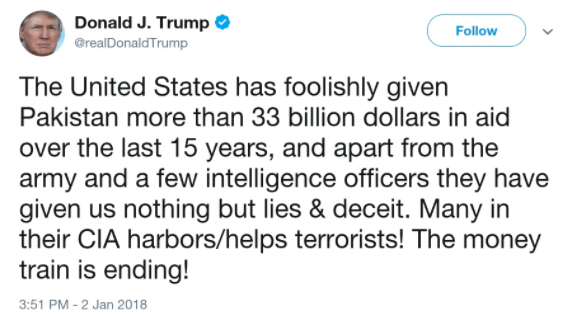I‘m broadly sympathetic to President Trump’s New Year’s Day tweet on Pakistan.
The United States has foolishly given Pakistan more than 33 billion dollars in aid over the last 15 years, and they have given us nothing but lies & deceit, thinking of our leaders as fools. They give safe haven to the terrorists we hunt in Afghanistan, with little help. No more!
— Donald J. Trump (@realDonaldTrump) January 1, 2018
That said, a better tweet would have been something along the following lines.

Don’t get me wrong, Trump is correct in his broad strategic approach to Pakistan. As I’ve documented and posited, the Pakistani establishment remains unacceptably comfortable with using terrorist groups as proxies. Recognizing the threat that poses to our interests and reflecting Pakistan’s relative stability, Trump is right to roll the dice here.
Indeed, Trump’s tough approach finds support in a rather unusual place: Naveed Mukhtar’s September 2014 research paper at the U.S. Army War College. The current director of Pakistan’s ISI intelligence service (an agency notorious for its double-dealing with terrorist groups) Mukhtar argued that the U.S. had to “adopt a firm approach to dissuade regional actors from taking provocative actions to intervene in Afghanistan’s internal affairs during and after the United States withdrawal.”
Seeing as Pakistan is the most problematic interventionist in Afghan politics, Trump has good cause to hold Mukhtar to his word.
And if Pakistan refuses to play ball, Trump should take alternative action by striking those who threaten U.S. citizens.
Nevertheless, that’s not the whole story here. Because the Pakistani army also deserves Trump’s recognition for its fight against terrorists.
While some top army leaders remain sympathetic towards groups like the Haqqani network and the Taliban (and nearly all are obsessed with the perceived threat of India), their soldiers have taken more than 5,000 casualties in counter-terrorism operations over the past 10 years. Those casualties might have fought for their country, but their sacrifices helped save American lives.
But it’s not just the junior ranks. Raheel Sharif, Pakistan’s former army head between 2013 and 2016 was a particularly courageous commander who took the fight to the terrorists.
As I say, this does not delegitimate Trump’s sentiments: the president is right to attempt to shift Pakistan’s strategic conception of what it must do to secure its interests in the region. It is simply to say that as he does so, Trump should point out the positive elements who work in service of our common security.
